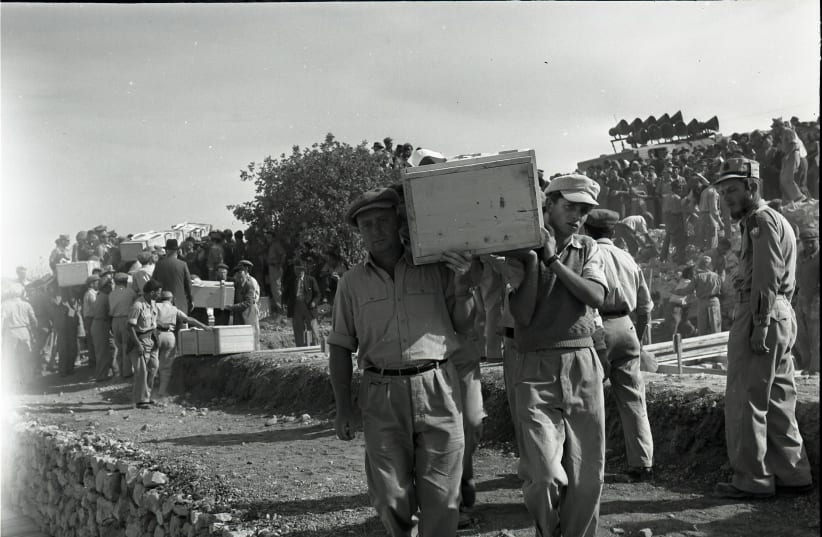Among those who fell in the War of Independence was Amnon Zilberspitz, a Holocaust survivor from Hungary who immigrated to Israel, settled in Kibbutz Dorot, enlisted in the Givati Brigade, and was killed in the battles of Beit Guvrin by an Egyptian sniper.
Half a million Holocaust survivors survived the inferno and were gathered in the DP camps in post-Holocaust Europe, waiting to begin new lives overseas or in the Land of Israel. From this number, 360,000 immigrated to Israel, most of whom had not belonged to any Zionist organization before their immigration. After surviving the Nazi torture, they settled in Israel and immediately joined the national mission to build the Jewish state.
The Sabras and even some of the leaders of the Yishuv acted coolly towards them in the early years after their immigration. Despite the negative way they had been treated, those same survivors joined in the War of Independence with all their energy and numbered almost half of the fighting force in the war.
Holocaust survivors fought in the War of Independence on every front – in the breakthrough to Jerusalem, in the Negev, in the liberation of the Galilee, and as Shaike Gavish, later commander of the Southern Command, said: “Without the Holocaust survivors, we would have been defeated.” More than one-third of the dead in the War of Independence were Holocaust survivors.
In Natan Alterman’s “The Silver Platter,” a classic of Hebrew poetry recited at Remembrance Day ceremonies in the early years of the state, the place of Holocaust survivors was absent. Alterman wrote sympathetically about Holocaust survivors in later works.
Without any institutional and organizational representative assisting in their absorption, the survivors began to integrate into Israeli society like a phoenix rising from the ashes. In 1949, the survivors established 45 settlements throughout the country, doubled the population of the kibbutz and the moshavim movements, and began to integrate into the activities of the young state.
Their influence in the legislative process led to the Yad Vashem Law, the Holocaust Remembrance Day Law, and the Nazi Victims Law. Many of them joined the legal system as judges, and even as the president of the Supreme Court.
Some 1,350 Holocaust survivor physicians joined the country’s fledgling medical system and made up more than a third of the medical system, primarily in the periphery. Many of them joined the security forces and the IDF, reaching high rank and receiving numerous awards. Holocaust survivors integrated into academia and research, and many of them became outstanding researchers and even won the Israel Prize. In science, the Nobel Prize in Chemistry was awarded to Holocaust survivors. In hi-tech, a Holocaust survivor founded Intel, which employs 14,000 people in Israel. In art, literature, theater, cinema and media, survivors have stood out. Even in politics, Holocaust survivors excelled, becoming mayors, Knesset members and ministers.
Until the Eichmann trial in 1961, there was little public recognition of Holocaust survivors, and many were silent. “The Eichmann trial straightened the backs of Holocaust survivors,” Mickey Goldman said this week, rightly so. Sixty years after the trial, the Israeli public has begun to change its attitude toward survivors. The public started to study their experiences and their suffering, beginning a process of learning and sympathy, but there is still a way to go.
The media occasionally points out the poverty of Holocaust survivors. Indeed, it is our duty to take care of them. However, most of the Holocaust survivors who have joined the society do not seek assistance. On the contrary – they are the ones who help build the country in all walks of life. There are more than a million children of Holocaust survivors, active in hi-tech, science, academia, building communities, business, economics and law.
No Western country recognizes the phenomenon of immigration and integration into the country’s life like that of the Holocaust survivors in this country. Holocaust survivors established their homes on their own, without any assistance from any institutional body.
As the number of Holocaust survivors naturally decreases, and with the abundance of recent research and essays on their contribution to the building of the state, we must continue the process of appreciation in public discourse to express gratitude for their contributions.
The March of the Living, whose purpose is to carry the torch of remembrance and perpetuate the legacy of the Holocaust and the rebirth, has always cultivated continuous contact with Holocaust survivors around the world. Holocaust survivors have guided and led educational visits to Poland, and youth continue to connect with them after their visits.
It is incumbent upon each of us to continue the process of recognition and appreciation. We thank the Holocaust survivors for their significant contribution to the building of the Land of Israel and for the support of the many Holocaust survivors overseas in strengthening the State of Israel and strengthening Jewish education.
The survivors chose to live purposefully. They chose life. They chose to build up our state and people. Let us never forget their legacy and our duty to carry it forward from generation to generation.
Avi Dickstein is a board member of March of the Living and chairman of the Yom Ha’atzma’ut event.
